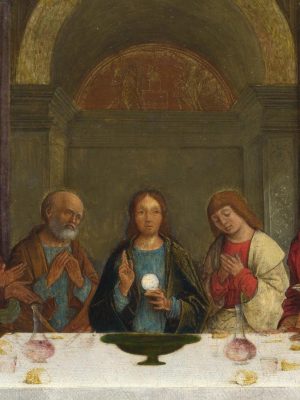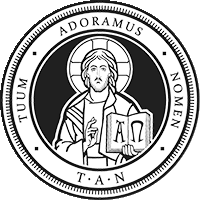No one has ever desired anything more than God desires to draw us into union with himself. That sage perception of an eminent scholar of theology has been the guiding principle for much of my own theological reflection, teaching, and preaching through the years. This pithy axiom is essentially a summary of the whole of the narrative of the Bible, from the first words of Genesis to the closing line of Revelation.
It is on account of God’s desire for us to share in his divine life that the Son of God became incarnate of the Virgin Mary for us, endured his passion and death for us, and instituted the sacraments, again, for us. So much has he desired to remain with us so that we might share in his life here and now, and especially for eternity, that he instituted the sacrament of the Most Holy Eucharist on the night before he died. This is no mere spiritual presence. The Holy Eucharist is, as Christ himself has said, his own Body and Blood. Only the kind of love that knows no bounds would have Christ insist that we eat his Body and drink his Blood, now resurrected and ascended to the right hand of the Father. When we partake of the sacrament of his Body and Blood we also receive his divinity and his human soul within our very beings. What kind of God is this that not only redeems sinners from eternal death but commands them to feed on him such that they become what they consume?
Man is divinized by his participation in the life of the Blessed Trinity, and the Eucharist is the continued nourishing of our divine life. This participation, by God’s own plan (because of the kind of nature he has created man to have), is not some mere subjective claim or wish or distant hope. Man, who is not only a soul but an embodied soul, has been given by Christ himself the sacraments of salvation, which minister divine grace to the soul through the medium of bodily sensible signs. The Eucharist stands at the center of the sevenfold sacramental system as the unique and abiding sign of God’s desire for us to share in his life. Nothing could be more objectively real than Christ’s sacramental presence in the Eucharist at the Sacrifice of the Mass through the ministry of those men Christ has chosen as his priests.
Having been created to share in the very life of God, the Holy Eucharist is the beacon by which we find our way through the mists that sometimes shroud our eyes from the glory that awaits us. The mists may take the form of struggles with sin, illnesses, or even the imposed sufferings resulting from the free will of other human beings. Through it all, Christ stands in his full radiant and sacramental presence before us; he is present in the tabernacles and on the altar at Mass in our Catholic churches. He will never abandon us. He will not stop being with us, even until the end of the world. May we simply give our humble assent to the divine plan.
This article is taken from a chapter in A Year with the Eucharist, which is available from TAN Books.









